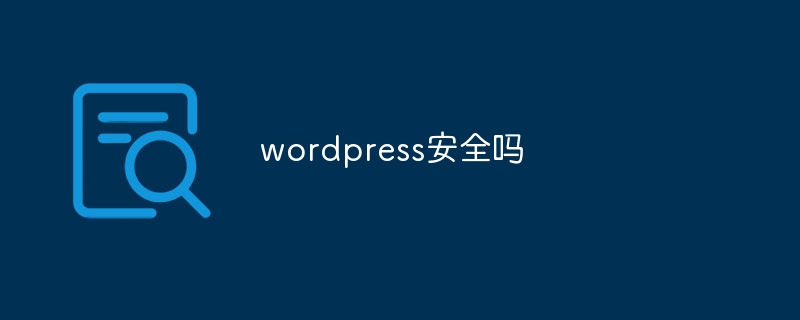
WordPress is relatively safe, but certain measures still need to be taken to enhance security: 1. Regularly change the password for the login account; 2. Update WordPress core programs, plug-ins and themes to the latest version ;3. Disable the administrator account and use other accounts to manage the website, etc.

The operating system for this tutorial: Windows 10 system, wordpress version 6.2.2, Dell G3 computer.
WordPress is relatively secure, but it is not perfect and certain measures still need to be taken to enhance security.
1. Advantages of WordPress
Due to its huge share, WordPress security issues have received widespread attention and been repaired in a timely manner.
The development community is active and constantly developing new security standards and updated versions.
Various plugins, themes, and packages are available to enhance security.
2. Disadvantages of WordPress
Because of its popularity, many attackers will regard it as a target. Attempt to hack.
Website administrators may not have the skills to protect their sites from attacks and respond to incidents in a timely manner.
The data of legitimate users or customers is at risk of being stolen.
3. How to use WordPress to protect your website to the greatest extent?
#Use complex and strong passwords in WordPress and turn on two-factor authentication.
Change the password for your login account regularly.
Install and enable a firewall, such as Wordfence or Sucuri Security plug-ins, etc.
Update WordPress core programs, plugins, and themes to the latest version.
Prohibit unnecessary file uploads and delete unused plug-ins that contain vulnerabilities.
Direct access to the wp-includes and wp-content directories is prohibited.
Disable the administrator account and use another account to manage the website.
Change the WordPress backend panel URL to a custom name.
Back up your data regularly.
In conclusion, to keep your website safe, keep paying attention and implement good WordPress security measures.
The above is the detailed content of Is wordpress safe?. For more information, please follow other related articles on the PHP Chinese website!